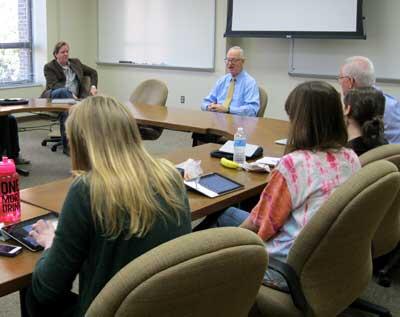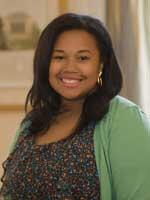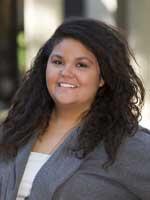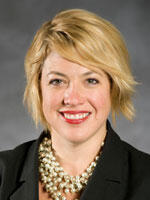Oct. 31, 2012
Election a lively presence on campus
Share this story
As young voters in a battleground state, VCU students in some ways are at the center of the political world. And campus consequently has been buzzing with election talk in recent months as organizers, advocates and candidates bring their messages to the VCU community.
“It’s not just Virginia that is talking about Virginia right now,” said Mechelle Hankerson, executive editor of the Commonwealth Times and a contributor to the Washington Post’s “The 12” election project. “It’s the whole country.”
On campus, students cite the economy, health care and women’s rights as among the most pressing issues in this year’s election. Many undergraduates say that they have approached the current presidential campaign differently than any other because they are voters now – participants instead of mere observers.
“It’s always been an exciting, upcoming point in life,” said Ali Muir, a freshman.
A sample of the election activities on campus:
A Class

Presidential campaigns can be won or lost based on how many people turn out to the polls on Election Day. In 2008, roughly 75 percent of all eligible voters showed up to vote in Virginia’s presidential election. The following year, for the gubernatorial race, only 40 percent of voters participated. Tides were turned in both elections because of the number of people participating in the democratic process.
This is why Virginia Commonwealth University Mass Communications students Alix Hines and Emily Satchell feel it’s so important for students to be engaged this year.
“Basically we just want to encourage students to vote, that their vote matters,” said Satchell, a journalism major. “It doesn’t matter if you’re just one person. It makes a difference.”
Satchell and Hines are classmates in an Honors College course, “Social Media and the Presidential Election,” taught by Jeff South and Marcus Messner, Ph. D., in the College of Humanities and Sciences' School of Mass Communications. The class focuses on studying the social media activities of both presidential candidates while also challenging students to craft a social media campaign encouraging VCU students to “Get Out the Vote.”
By breaking into groups, the class established a website, created Facebook and Twitter accounts, designed an “Uncle Ram” logo and printed their #VCUVotes hashtag on all of their T-shirts and print materials.
“There’s definitely a time investment, but it’s so exciting that it doesn’t feel like it takes that much out of our already busy schedules,” said Hines, a dual print and broadcast journalism major. “The reward of doing this kind of campaign and knowing that we might be making a difference is definitely worth any time we put into it.”
The class efforts have benefitted from the diversity of expertise students boast. Class members include majors in mass communications, chemistry, political science, dance, history, computer science and biology.
“One thing they have in common is they all are incredibly sharp and engaged,” South said. “Their eclectic backgrounds contribute a lot to the class. For our voter registration and information campaign, we relied on some students’ creativity and design sensibilities – and other students’ analytic and organizational skills. The computer science in the class even created a software program to match your position on issues with the candidate who best reflects your views.”
The class pushed hard to register students to vote before Virginia’s Oct. 15 deadline and is now focused on making sure everyone knows where they need to go on Nov. 6.
“It’s really confusing in a city where there are so many different polling places,” said Hines. “So, we definitely try to get that information out there.”
Students of the class also gathered nonpartisan information regarding both candidates’ positions on key issues such as foreign policy, education, social issues and the environment to better inform VCU students about their choice in this election. The handouts with this information are posted to the class website.
Hines and Satchell are optimistic about their class’s efforts in reaching out to other students.
“Engaging students both physically and online is a good way to ‘Get Out the Vote,’” said Satchell.
— Megan Schmidt
An Organizer

Amani Walker did not like politics growing up. The process seemed dirty and unsavory. Then she took an introductory government course with John Aughenbaugh, an instructor in the Wilder School of Government and Public Affairs at VCU.
“As soon as I finished that class, I went to student enrollment because I knew I had to double major in political science,” said Walker, already an international studies major.
Walker has embraced politics with the zeal of the converted, becoming an outspoken and passionate proponent of politics and the U.S. democratic process. Her classroom epiphany has propelled her to be at the forefront of student voter education efforts on the VCU campus in this year’s election. She serves as the elections chair for the Student Government Association, the political action chair for the NAACP at VCU and the co-founder of Ram the Vote, a collection of nine student organizations collaborating on voter registration education efforts.
In each of her roles, Walker has worked diligently to make the VCU student body more informed and active.
“You empower people when you educate them,” Walker said.
For the first time this fall, the SGA chose to mingle its senate elections with national matters. After students made their senate selections in online voting, a prompt gave them the option to vote in a mock presidential election reserved for students. Walker said the twist on the SGA elections served to reinforce for students the connection between national and local elections, and the broad range of ways that democracy affects their lives.
“It’s a way of helping them understand their civic responsibility both here at VCU and in the rest of the country,” Walker said.
The NAACP at VCU has participated in multiple voter efforts, which culminated on Oct. 30 with a mock presidential debate featuring students representing the Obama and Romney campaigns. Representatives from the Virginia senatorial election between former governors George Allen and Tim Kaine also were on hand to provide information to those in attendance.
Ram the Vote has proved to be one of the most active election-season efforts on campus. The inter-organization collaboration has involved various on-campus registration and education events, including a panel discussion, “A Vote-less People is a Hopeless People,” that featured candidates in local and state races.
“A lot of young people don’t pay attention to state and local elections,” Walker said. “But we tried to show them that they need to pay attention to those races because they have a great role in what impacts us.”
Walker said voter education helps bring election issues into focus. In particular, when students are behind outreach efforts, it provides a greater push for fellow students to take notice, heightening their interest and own engagement.
“It’s cool to have a group of students who are reaching out to other students to get them involved and doing it from a nonpartisan point of view,” Walker said.
On Election Day, Ram the Vote will make one final plea to students to cast their votes. The organization has worked with VCU to arrange for escort shuttles to carry students to voting stations from 9 a.m. to 5 p.m.
“This year you really don’t have an excuse,” Walker said.
— Tom Gresham
A Journalist

Mechelle Hankerson is a close observer of the heated presidential battle this year, serving as one of the student journalists on “The 12,” an effort by the Washington Post to provide innovative online coverage of the campaigns in 12 battleground states, including Virginia – Hankerson’s state and coverage area.
The Washington Post and a spotlighted state in a presidential election. It’s a meaty role for a student. Hankerson said she’s made a point of focusing on the task at hand and not allowing the weight of the project to affect her judgment.
“I try to keep in mind what the purpose of the project is and not worry too much about what people are expecting,” Hankerson said. “I like to work with my head down.”
For “The 12,” Hankerson keeps constant tabs on important election developments throughout the state of Virginia, gathering the information in a series of links and posts on a Tumblr account – http://the12.washingtonpost.com/tagged/Virginia – to provide a running record for readers.
In her work with the Commonwealth Times, Hankerson has grown accustomed to managing a large beat area and sorting through the noise to determine what’s news and what is not. She also has experience covering politics and government with VCU’s Capital News Service, which involves VCU journalism students providing state government coverage to Virginia’s community newspapers and other media outlets.
Hankerson said covering national politics creates a special set of challenges. There are practical matters, such as acquiring a press pass for a large campaign event, and there are more ambiguous ones.
Partisans inundate her with arguments, rumors and cited facts. Hankerson must wade through the information to separate the legitimate arguments from the illegitimate ones and the facts from mere opinions, and she must consider how all of the information factors into the elections in her state. Hankerson appreciates everything that comes her way, recognizing that there is meaning – strategy, purpose and ideas – in all of it
“It’s been eye-opening to become really aware of things that otherwise I wouldn’t be aware of,” Hankerson said. “It’s been a great chance for me to learn about pretty much everything with this election.”
The Tumblr format also has proved to be a new experience. The social media vehicle encourages users to incorporate a visual, interactive element into their posts. In the changing world of media, this kind of multimedia background is a critical asset for a young journalist.
“It’s been a learning experience for sure, but it’s very valuable,” Hankerson said.
— Tom Gresham
A Pundit

Virginia is at the dawn of a new era.
The political landscape of the historically red state is changing, said Jennifer L. Thompson, assistant professor of political science and director of external relations for the Wilder School of Government and Public Affairs in the College of Humanities and Sciences at VCU. While voters in historic swing states such as Iowa and Ohio are used to the attention that comes with a presidential election, the extra notice is taking many in Virginia by surprise. And VCU sits in the thick of it.
"One of the reasons that VCU has been so on the radar screen — both in terms of national commentators and the candidates themselves — is because in 2008, even though [Virginia] went overwhelmingly for Obama, we weren't really a must-win state at that point," she said. "[This time] we're in the hub. Virginia is one of the top three must-wins. And that puts us in a whole new category of attention from people outside of Virginia and the candidates."
The newfound focus includes millions of dollars in political advertising from the candidates and Super PACs, but it also meant the state is getting more media attention.
The scrutiny doesn't faze Thompson, who has been a pundit for the past 15 years, providing TV, radio and print analysis on politics and policy.
"I've done politics in Missouri for a long time, and they've always been a bellwether, so I'm quite used to the attention," she said. "For those born and raised in Virginia or who have been living in Virginia for a substantial part of their lives, this is new, this kind of attention."
One thing has changed for the pundit this year: the addition of social media, which adds a whole new dimension to political commentary. Although Thompson has been on Twitter for just two months, she has quickly become an enthusiast, tweeting throughout the last presidential debate. She plans to live-tweet — as @Jen_LouiseT — during election day coverage and results.
"Even though I'm new to [social media], I find it incredibly exciting," she said. "People can take something you say and run with it. And that becomes even bigger and can spark whole new debates. I love it for that reason. It's unfiltered."
Those same elements that add excitement to social media also make it risky.
"I like taking a step back, which is hard with social media because it's in real time," Thompson said. "I find that to be the most challenging thing about doing social media as well as media commentary, because you have to be really careful not to do too much knee-jerk commentary. You have to be fast enough to be relevant but slow enough to be thoughtful, deliberate and, hopefully, correct."
One byproduct of social media this year is that it adds to the attention on Virginia, Thompson said.
"Not to mention we have a super-pivotal senate race here in the commonwealth, with two former governors. That's also a must-win race in terms of the makeup of the senate," she said. "So it's really the perfect storm here in Virginia."
— Leila Ugincius
Subscribe to the weekly VCU News email newsletter at http://newsletter.news.vcu.edu/ and receive a selection of stories, videos, photos, news clips and event listings in your inbox every Thursday.
Subscribe to VCU News
Subscribe to VCU News at newsletter.vcu.edu and receive a selection of stories, videos, photos, news clips and event listings in your inbox.










